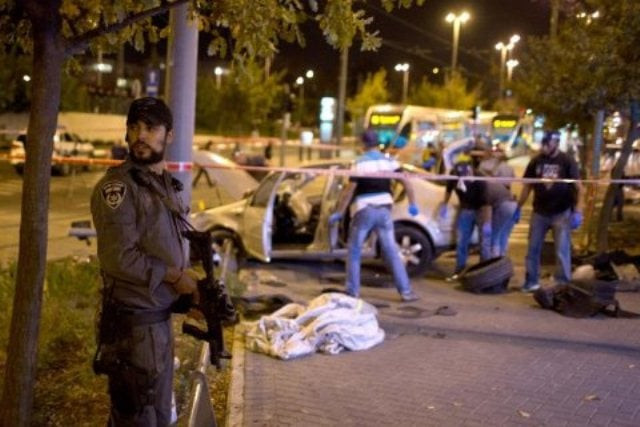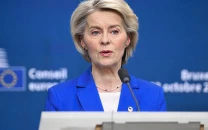Policeman killed in new Jerusalem car attack
Internal Security Minister Yitzhak Aharonovitch praised the actions of the policeman who shot the driver

The rampage followed clashes at the flashpoint al Aqsa mosque compound earlier in the day between police and Palestinians.
Police described the car incident, which took place on the seam line between west Jerusalem and the city's annexed Arab east, as a "hit and run terror attack".
The driver, Ibrahim al Akari, whom police identified as a Palestinian from Shuafat refugee camp in east Jerusalem, hit two groups of pedestrians before getting out of the vehicle and attacking passers-by with an iron bar.
He was then shot dead by police.
Palestinian rights group Addameer said Akari's family had been told his body would be released late Thursday and that only 35 mourners would be allowed to attend his funeral.
The attack mirrored an incident on the same road on October 22 when a Palestinian rammed his car into a group of pedestrians, killing a young woman and a baby.
Police spokeswoman Luba Samri said the driver had first struck policemen on Wednesday near their border headquarters, before hitting a group of pedestrians waiting at the Shimon Hatsadik light rail station.
After stopping, the driver, who was injured during his rampage, "got out of the vehicle and started to hit people with an iron bar," she said.
Emergency services spokesperson Zaki Heller said two of the wounded were in very serious condition.
US Secretary of State John Kerry condemned the attack as a "terrorist act" that "only raises tensions" in the tinderbox region.
Jerusalem Mayor Nir Barkat urged the government to act with a firm hand against anyone contemplating "terror or rioting".
He was referring to persistent unrest which has gripped the city's east for the past four months.
"The only answer is to get the city back to normal and continue our daily lives because that sends a message to these terrorists: We are here and we will not leave," he said.
The attack was hailed by the Hamas movement, which described Akari as a "hero" whose actions were a "natural response" to Israel's actions at the al Aqsa compound.
Israeli Prime Minister Benjamin Netanyahu accused Palestinian president Mahmud Abbas of encouraging such attacks by sending condolences to the family of a Palestinian shot dead by police last week over the attempted assassination of hardline rabbi Yehuda Glick.
"The hit-and-run attack in Jerusalem is a direct consequence of Abu Mazen's (Abbas's) incitement and that of his partners in Hamas," he said.
Internal Security Minister Yitzhak Aharonovitch praised the actions of the policeman who shot the driver.
"A terrorist who harms civilians should be killed," he said in remarks broadcast on television and radio.
Shortly after the attack, clashes broke out in both Shuafat refugee camp and Issawiya, also in east Jerusalem, an AFP correspondent reported.
The city had been on edge following heavy clashes between police and stone-throwers at the al Aqsa mosque compound ahead of a visit by a group of Jewish rightists.
The clashes prompted a furious response from Jordan, which has custodial rights over Muslim holy sites in Jerusalem, with Amman recalling its ambassador to Israel "in protest at Israel's escalation".
It will also lodge a complaint with the UN Security Council, which the Palestinians are asking to hold an emergency meeting.
The compound, which is holy to both Jews and Muslims, is one of the most sensitive sites in the Middle East.
"Dozens of masked protesters threw stones and firecrackers at security forces who then entered the Temple Mount and pushed the demonstrators inside the (al Aqsa) mosque," the police spokesperson Samri said, using the Israeli term for the compound.
In a bid to quell the disturbances, police entered "several metres (yards)" inside the mosque to remove blockages set up by the protesters, she said.
Amin Abu Ghazali of the Palestinian Red Crescent said 39 people were wounded, six of whom were in serious condition.
The compound was later reopened to visitors with 108 Israeli Jews entering alongside 200 foreign tourists, police said.
Although Jews are permitted to visit the plaza, they are not allowed to pray for fear it could stoke tensions at the site, which is the third holiest shrine in Islam after Mecca and Medina in Saudi Arabia.
Thursday could bring fresh trouble as a group of far-right Israelis plan to march to the compound's gates from the site where Glick was shot and wounded by a Palestinian a week ago.












1724319076-0/Untitled-design-(5)1724319076-0-208x130.webp)






COMMENTS
Comments are moderated and generally will be posted if they are on-topic and not abusive.
For more information, please see our Comments FAQ